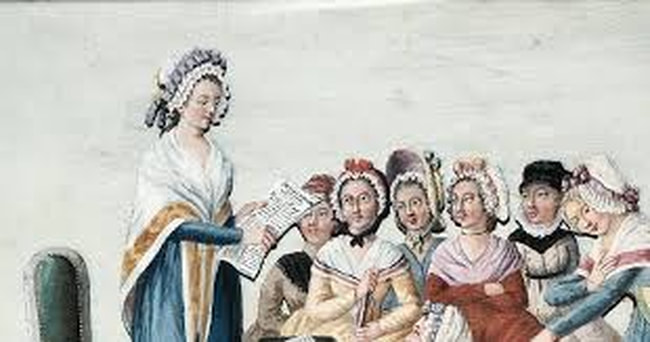|
In the summer 1791, Etta Palm D’Aelders, citizen of Holland, and long term resident in Paris, member of the Cercle Social, was the recipient of ‘atrocious calumnies’ from the revolutionary paper ‘La Gazette Universelle’ run by Louise Kéralio Robert and her husband. The couple accused her of being a Prussian spy, and a counter-revolutionary. Etta had been a spy. When she’d settled in Paris, she’d been tasked, discreetly, with finding out what her countrymen felt about the revolution. But she was also very attached to France and the republic. When the accusations came, she felt that the best way to prove her innocence would be to publish the speeches she had given and the ensuing correspondence with various Regional revolutionary clubs. The collection was titled ‘Appel aux Françoises sur la regénération des moeurs et nécéssité de l’influence des femmes dans un gouvernement libre”. Etta was a member of the Cercle Social des Amis de la Verité, one of the first Revolutionary clubs – run by Condorcet and other Girondins – that had decided to accept women as members. Her first contribution was a speech given at the end of 1790, and defended women’s rights of citizenship. She had been invited because a month earlier, she had stood up and defended another speaker, Charles-Louis Rousseau, who’d argued in favour of women’s political rights. ‘Women!’ He’d said. “Until now you were only mothers. Now you must be citizens too!’ Rousseau’s feminism had its limits, as we can see from the treatise he published a few months later ‘Essai sur l’éducation et l’existence civile et politique des femmes’ where he argues that for women, the duties of citizenships mostly lie in the giving birth to and bringing up citizens! But the audience jeered, and Rousseau hesitated, and Etta took over. A short while later she received the invitation to talk about women’s citizenship. She did not mince her words. Men were being just ‘by half’ making laws in their favour and against women, simply because the power was in their hands. Women were fated through marriage to a painful and awful slavery, their husbands were despots, and their existence secondary. None of this was deserved, she argued, refuting the common objection that women were suited to slavery. Women were, she granted, physically more ‘delicate’ than men, but they made up for it through moral strength. She cited famous political women: Elizabeth I, Catherine II, Joan of Arc, but asked men to look to their wives and daughters and ask themselves whether they were not just as capable as they of patriotism and courage. Her talk was printed and shared with regional branches of the Amis de la Verite, who in turn shared it with their wives, and invited them to join them in their clubs. A few months after her resounding success, Etta petioned for, and was granted, the right to found a new society, a branch of the Amis de la Verité, but for women only. The purpose of the Société Patriotique et de Bienfaisance des Amies de la Véritéwas to plan and enact humanitarian projects, especially towards indigent women, widows, or young women who had come from the country to work as wet-nurses and found themselves alone and abused, or putting up school for young women of poor families.
Etta succeeded in rebutting the Roberts’ accusations, but when four years later France went to war with the Netherlands, she was imprisoned in The Hague. She was released after three years, but weakened by the ordeal, she died a few months later at the age of fifty-five.
0 Comments
Leave a Reply. |
About
This is where I live blog about my new book project, an intellectual biography of three French Revolutionary women philosophers. Categories
All
Archives
November 2022
|

 RSS Feed
RSS Feed